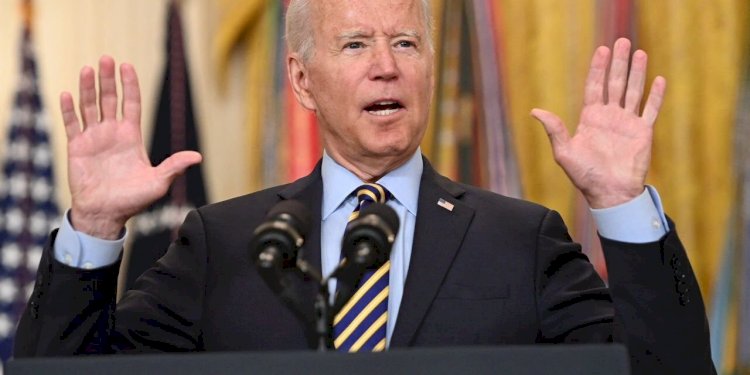America May Pay Dearly For Defeat In Afghanistan - The Economist

JOE BIDEN may have more foreign-policy experience than any American president in 30 years, but he is haunted by the brutal assessment of his judgment by Robert Gates, who was secretary of defence under the president both men served, Barack Obama. Mr Gates called Mr Biden “a man of integrity” whom it was impossible not to like. Yet, writing in “Duty”, his memoir, he added: “I think he has been wrong on nearly every major foreign-policy and national-security issue over the past four decades.”
It is too soon to know whether history will add Mr Biden’s decision to withdraw from Afghanistan to a list of calls that includes support for the war in Iraq and opposition to the raid to kill Osama bin Laden. But in the short term the abandonment of Afghanistan to Taliban rule after nearly 20 years of American commitment—the images of panicked retreat and the pleas of terrified Afghan allies, the stench of great-power humiliation that inevitably recalled the evacuation of Saigon in 1975—mocks Mr Biden’s claims that “America is back”; that conviction in democracy and compassion for the oppressed have a place beside self-interest at the centre of his foreign policy; and that at least, after four years of buffoonery, American leadership is once again competent.
As recently as on July 8th Mr Biden dismissed any chance that American diplomats might wind up scrambling for an exit as they did in Vietnam. “None whatsoever,” he said. “Zero.” He said the possibility of “the Taliban overrunning everything and owning the whole country is highly unlikely”. By August 14th Mr Biden was reduced to trying to shift some blame to Donald Trump. “When I came to office, I inherited a deal cut by my predecessor,” he said in a statement. He argued the deal “left the Taliban in the strongest position militarily since 2001” and noted it imposed a May 1st, 2021 deadline for American withdrawal.
Yet Mr Biden also stood behind his own decision, saying that America’s mission of eliminating the terrorist threat from Afghanistan was accomplished years ago. His alternative to withdrawal, he said, would have been to commit more troops “to fight once again in another country’s civil conflict.” He said he was the fourth president to preside over an American troop presence in Afghanistan and would not “pass this war on to a fifth.”
Mike Pompeo, Mr Trump’s secretary of state, rejected Mr Biden’s remark about Mr Trump’s deal as “pathetic blame-shifting” and insisted the Biden administration had failed to create conditions for an orderly withdrawal. Yet, appearing on August 15th on “Fox News Sunday with Chris Wallace,” Mr Pompeo also apportioned blame to the Afghan president, Ashraf Ghani, calling him more interested in accumulating American money than in talking to his own people, and he said the American armed forces had failed across two decades to train Afghan forces. Reporting by the Washington Post two years ago showed the armed forces and civilian leaders misled the public throughout the war, insisting on progress that did not exist, including in training Afghan soldiers. In fact, by supplying so much combat experience, America appears to have been more effective in training Taliban fighters. Veterans are stepping forward to say they now feel their sacrifices were for nothing, a conclusion that should help force a reckoning within the armed forces, as after Vietnam.
Polling as recently as on August 9th has shown that, if asked to express a view, Americans said they supported Mr Biden’s withdrawal. The left within the Democratic party wanted America out long ago, and his establishment Democratic critics have no other political home. Mr Trump’s own disdain for America’s involvement in Iraq has blunted attacks by Republicans, leaving them to complain about the manner of the withdrawal rather than the fact it happened. Further, the overnight evaporation of the Afghan security forces, after the commitment of more than $80bn from America, may lead many Americans to conclude the Afghan leadership failed the Americans, rather than the other way around. That said, images of Taliban brutality may shift the politics against the administration.
From the left and right, critics of Mr Biden’s withdrawal insist that America could have indefinitely sustained the recent, uneasy status quo in Afghanistan by maintaining a small support presence of perhaps 2,500 soldiers. These critics view Mr Biden as repeating the mistake Mr Obama made in Iraq in 2011—at the urging of Mr Biden. In withdrawing American troops then, Mr Obama opened the door to a takeover by Islamic State.
Mr Biden’s aides respond with their own counter-factual. Antony Blinken, the secretary of state, insisted it was only the American commitment to withdraw that had led the Taliban to suspend attacks on American troops. Had the Biden administration reneged, he said on the NBC program Meet the Press on August 15th, “I would be on your show right now explaining why we were sending tens of thousands of forces back into Afghanistan to restart a war that we need to end.”
Mr Blinken noted the Americans had expended a trillion dollars and more than 2,300 lives in Afghanistan. He said they had stayed longer than the British in the 19th century and twice as long as the Soviets in the 20th century. “There is nothing that our strategic competitors would like more than to see us bogged down and mired in Afghanistan for another five to ten to 20 years,” said Mr Blinken, appearing weary and pained. “That is not in the national interest.” Pressed on whether the administration was closing its embassy, Mr Blinken said it would maintain a core presence of diplomats and “in effect, an embassy, at a location at the airport”.
Mr Biden has said he will be judged in the end on whether a terrorist threat to America emerges again from Afghanistan. His aides insist that advances in military intelligence, tactics and capabilities since the 9/11 attacks mean that American forces will be able to pre-empt any danger. Along with the probable resistance of Pakistan to future counter-terrorism operations, the evident failure of American intelligence to anticipate the Taliban’s onslaught calls that assurance into question.
So does Mr Biden’s own inconsistent advocacy over the years for the use of force. He supported NATO air strikes in the Balkans, and opposed George H.W. Bush's war against Iraq before supporting George W. Bush’s second one. In the years since he has been more frequently an advocate of restraint, opposing Mr Obama’s intervention in Libya as well as his decision, in response to a renewed Taliban threat in 2009, to dispatch 30,000 soldiers to Afghanistan. Since Mr Biden was a child he has always been a risk-taker, trusting in the end in his own judgment. That pattern led to another appraisal that has long troubled him, from a largely admiring portrait in the great chronicle of American presidential politics, “What It Takes”, by Richard Ben Cramer. “Joe Biden had balls,” Mr Cramer wrote. “Lot of times, more balls than sense.”


















































